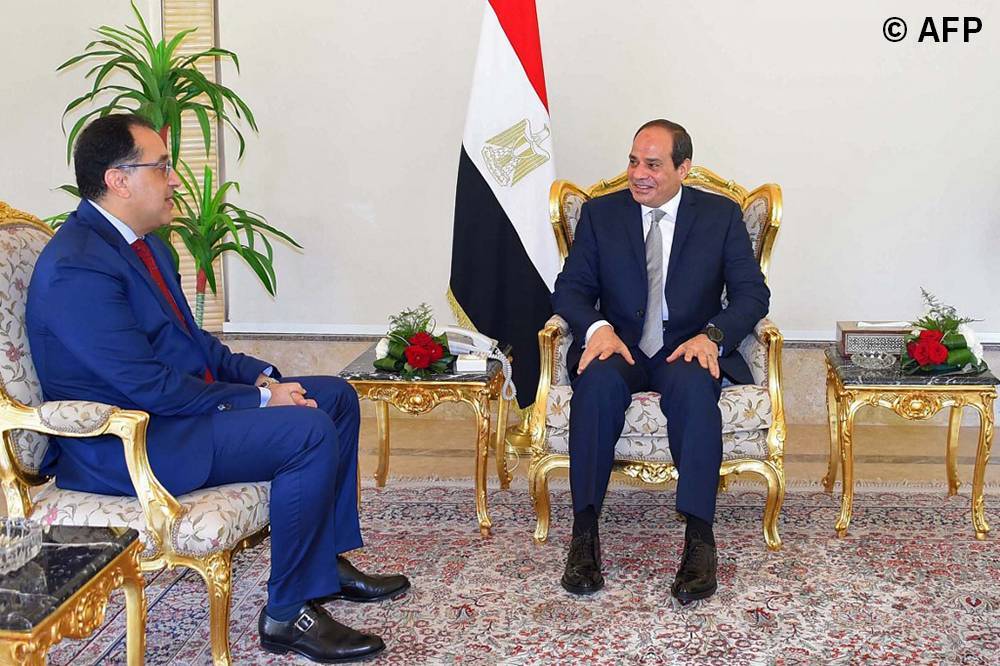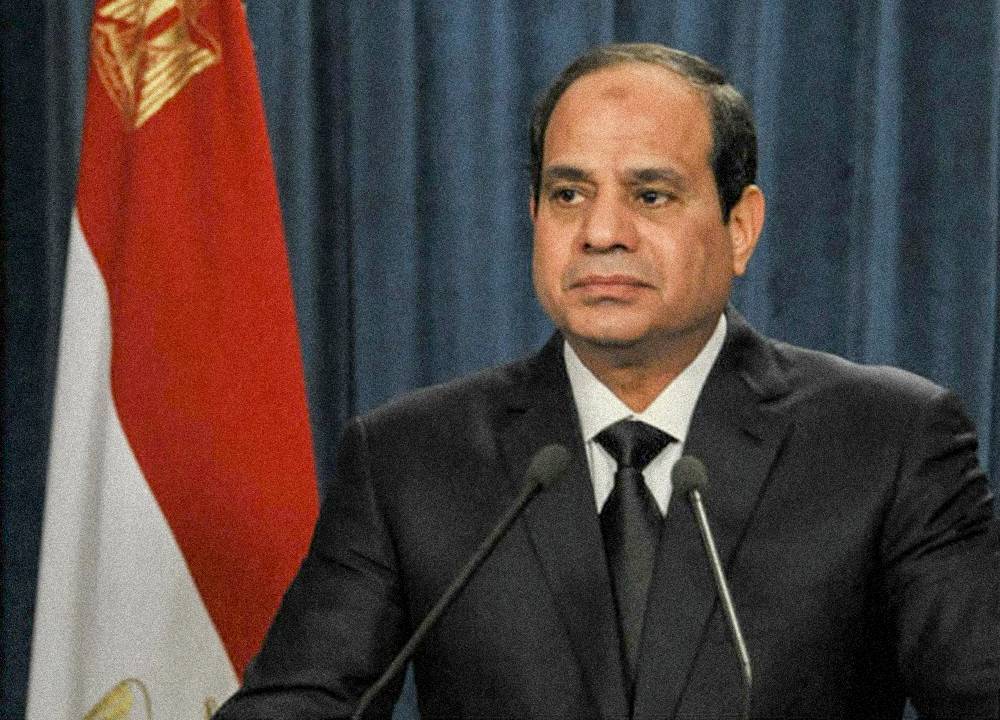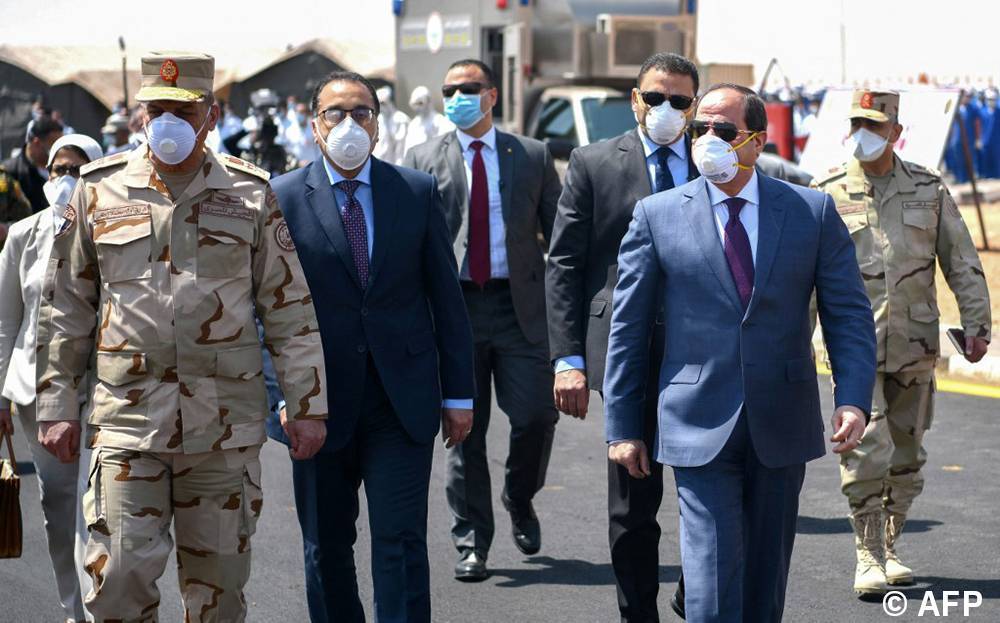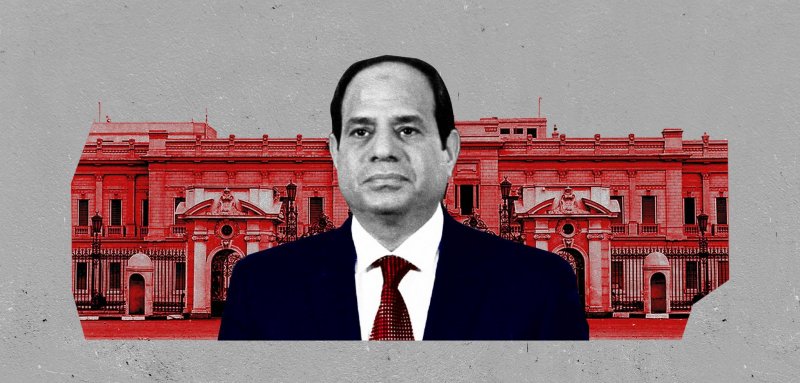The birth of a new country with the inauguration of the new capital... A declaration of the second republic.” This is how Egyptian President Abdel Fattah al-Sisi announced the “birth of a new state” during a speech he gave at the Armed Forces Educational Seminar (the 33rd Cultural Symposium of the Armed Forces) held on March 9, 2021.
Sisi’s remarks sparked mixed reactions, leaving Egyptians divided between skepticism, cynicism, optimism, and support — despite all having agreed on the vagueness and ambiguity of his words.
Sisi’s speech about a “new state” was not some random or offhand, spur-of-the-moment expression, since the new Administrative Capital is part of a broader plan that is moving at a steady pace. It has been envisaged to change the shape of Egypt into what the man is aspiring for.
The More Accurate the Information, the More the Money
In short, this is the core essence of Sisi’s project in order to change Egypt.
The President announced on more than one occasion that including the informal economy into the economic system and subjecting it to state control is one of the state’s basic goals. This was made evident in Egypt Vision 2030, a national agenda launched by the president himself.
Achieving this goal will achieve significant tax revenues for the state — from taxes on industrial and commercial activities so far still beyond the umbrella of the state. Securing this income will help implement the state’s development projects, also allowing it to be relatively free of the wait for Gulf support or international loans.
To achieve this goal, the system decided to move in two parallel tracks: digitization and financial inclusion.
Apart from different visions and different biases, it is still important to realize what is happening in Egypt now? And why?
The Beginning... A Confluence of Wills
The underwriting of the Suez Canal Extension project in 2014 was like a lamp that lit up to reveal the sheer amount of money moving within the darkness of the informal economy beyond the eyes and ears of the state.
The government was surprised by the 61 billion pounds that were collected in just eight days — 90% of which came from individuals, according to the statements made by the governor of the Central Bank of Egypt Hisham Ramez at the time.
Here, we are talking about approximately 55 billion pounds — most of which came “from under the tarp” (from obscure sources) and far from the banking system. The number was sufficient for the regime to realize the mere extent of the informal economy, which is not subject to any type of restriction or control.

Two wills met here: the will of a powerful general who has been looking for a great project during his reign that would bring about a real and radical change in the country and be attributed to his name, and the will of Mostafa Madbouly, the engineer hailing from the General Authority for Urban Planning. Madbouly brought with him many plans — a large part of which were prepared during the government of Ahmed Nazif — for projects waiting for those with the nerve to implement them.
Mostafa Madbouly was tested in the position of Minister of Housing and Urban Development. When he proved his competence, he was promoted in November 2017 to Acting Prime Minister, before he officially assumed the position in June of 2018, which saw the general and engineer together begin the journey of “Egypt Vision 2030”.
The Underground State
Despite the extreme centrality of the Egyptian state, it has always suffered from a lack of information about its systems. Its main concern has always been knowledge of the details concerning its political security — which has a rather narrow and extremely direct perspective.
As for the citizens’ biographical information, despite being a basic tool of governance, it remained scattered among the isles of isolated administrations or decades without its slightest benefit: taxes have nothing to do with the deeds registry administration, which knows nothing about the health authority, which in turn has never thought of coordinating with the education ministry.
There are tons of piled up papers within the files of the various ministries, without the slightest cooperation or link.
From here, Sisi began his project by seeking complete knowledge in all that “data” and collecting them within a central hub. Therefore, the position of “Advisor to the President of the Republic for Governance and Information Infrastructure Affairs” was created and assigned to Major General Mohammed Erfan, the former head of the Administrative Control Authority (ACA).
It was said at the time that this position was just a fictitious one, created specifically to appease the man “after he was removed from his position in the ACA”. However, the evidence and indications appearing within the statements of the head of state himself reveal his special interest in the data and information that has become the main thrust spearheading his project.
Sisi’s speech about a “new state” was not some random expression. Since the new Administrative Capital is part of a broader plan that is moving at a steady pace meant to change the shape of Egypt into what Sisi is aspiring for
This is the interest he expressed in the “Digital Transformation” initiative session at the 7th National Youth Conference, when he announced that all government data will be gathered in a central hub that he called “the mind of the state” in the new administrative capital. He indicated that through this “mind”, it is possible to coordinate interaction and communication between ministries and various bodies at all levels.

The Philosophy of Digital Transformation
On the official website of the Ministry of Communications and Information Technology, you will find an explanation of the “strategic direction” for the digital transformation in Egypt. According to what was mentioned there, it aims to transform the state into a digitally interconnected government, in order to improve the citizen’s quality of life and to enhance the values of transparency, accountability, and control.
Aside from complicated terminology, digitization is simply intended for the books and files stacked on the shelves of government agencies to be converted into digital copies uploaded to the system, making it easy to search for any information there. Thus, all the data — whether it was health, security, social, etc. — of the citizens or institutions can appear with the click of a button.
This transformation will achieve three basic benefits for the state, aside from the official goals announced on the ministry’s website:
It will reduce the number of employees within the weak government apparatus. This, of course, does not mean that employees will be dismissed. Rather, this could be done through early settlements, in addition to halting any new appointments, which is what the state has already begun doing. With time, the state gets rid of the legacy left behind from heavy bureaucracy.
It will reduce the direct engagement and interaction between citizens and employees, as well as limit the manipulation of record books and accounts. This will shut the door in the face of corruption within the middle and lower sections of government departments, especially since Egypt continues to decline within the rankings of corruption indicators, after it ranked 117 out of 180 countries in the Corruption Perceptions Index (CPI) for 2020 .
As for the most significant benefit of them all, it is that linking all ministries to each other and connecting them with banks will mean blocking all outlets for the “informal economy” and forcing it to enter the governmental system. This is the grand prize to be had from digitization.
The Mechanism of Digitization and its Steps
Hesham Ouf, the director of one of the companies entrusted with the digitization process, explains to Raseef22 the project’s business plan, “Digital transformation takes place in two tracks: the first includes the creation of huge software platforms capable of uploading that much data; whereas the second is turning the ‘data and information’ recorded in the government’s record books into a digitized form.”
Six specialized companies have been selected to carry out this task, under the personal and direct supervision of the Prime Minister himself.
Sisi’s project will create a new economic class. It will create job opportunities but will raise prices and cut subsidies, meaning a rising pressure on the poorer classes that may lead to an explosion. Sisi is well aware of this.
Ouf continues to explain the working mechanism, saying “First, the concerned ministry determines which of the documents are to be converted into digital form, then the company entrusted with digitizing it all comes and copies them through scanning. The company then catalogues and indexes the documents, submitting the new digitized copy to the concerned ministry for technical review and to ensure the accuracy of the data, after which it is presented to the Ministry of Communications for technical review before it is uploaded to the digital platform prepared to receive it.

Where To Start?
Egypt is a large country and its bureaucratic apparatus is very complicated. Therefore, it was imperative to define the points controlling the main functions of the state, which, by digitizing its data, the system can connect and control the isolated government divisions. This will be done through four main axes or, say, mega projects:
1- Transfer projects to the Administrative Capital: These are seven projects, through which all data and archives of 44 government entities (ministries and agencies) will be digitized, including those in the fields of health, education, trade, agriculture, electricity and everything related to the citizen’s dealings with the state.
2- The Secured and Smart Publications Complex project: It is the center through which any paper bearing the personal identity of the citizen will be issued, such as: ID cards, passports, death certificates, etc. In the future, all these will be issued online or through machines similar to bank ATM machines.
3- The Justice System Project: This is a major project that will include the Ministry of Justice, the Attorney General, and the Ministry of Interior. It is aimed at having all stages of litigation — starting from the report drawn up in a department, ending with the judge’s ruling, and passing through internal investigations, investigations of the prosecution, opinions of experts, and forensic reports — uploaded on a special platform that is easy to access within moments.
4- Projects of the Ministry of Finance: It is a package of projects mainly related to the working capital cycle, but the most prominent of which is the electronic invoice project, which is to be activated by next July. According to it, no official entity will accept a single paper bill from any company it deals with, and therefore no one will be able to submit a faulty or “bad” bill in the future. In addition, cash dealings between merchants will stop, and everything in the future will be done through bank transfers that can be monitored and counted.
These essential projects, and their accompanying sub-projects, are moving forward quickly so that all the data would be registered and accounted for, only leaving behind the issue of the funds of the shadow economy, which the state will move to subjugate and control it is too through the steps of financial inclusion.
All by the Grace of God and Egypt
In a telephone conversation with media figure Amr Adib, President Abdel Fattah al-Sisi answered the recurring question over the sources that the state obtains funds from for the implementation of various projects, saying, “The money comes from our country Egypt, and all of it is made possible by the grace of God.”
According to the official report issued by the Ministry of Finance for the fiscal year 2019-2020, tax revenues represent more than 76% of the state's total revenue.
The report reveals a remarkable growth in the volume of taxes collected this year by 17 billion pounds, and indicates that taxes collected from commercial and industrial activities increased by 17% over the previous year.
“A mature country is one that has a stable tax system.” This is how Professor of Economics and Financial Transformation Nada El Shazly begins her conversation with Raseef22, explaining, “The nation of Egypt believes that taxes are the best way to solve the problem of budget deficit as well as spending on new projects. It also realizes that the informal economy approximately constitutes 60% of the total economy. Accordingly, we are facing tax evasion that is approaching 80 billion pounds annually. The state wants this amount,” El Shazly says with a smile, before she goes on. “In order to obtain these funds, the state had to seek to introduce the informal economy under the umbrella of the formal economy, and this would only be done through financial inclusion.”
When Amr Adib asked President Sisi how he will finance all the massive projects he is pursuing, the answer was: “The money comes from our country Egypt, and all of it is made possible by the grace of God.
Financial inclusion, in its simplest definition, is having all citizens registered within the financial information services of the state — in other words, they have bank accounts. Thus, the state can collect taxes from them, accurately determine the true size of inflation, as well as monitor the volume of “cash” in the market, “which enables it to control the street and fight crimes of all kinds, starting from money laundering and ending with financing terrorism.”
Why Egyptians Avoid Banks?
In 2014, the first financial inclusion initiative started in Egypt. At that time, the percentage of citizens that owned bank accounts did not exceed 16% of the total population, bearing in mind that there are individuals and companies owning more than one account in several banks, and therefore the real number is undoubtedly less than 16%. The question is: Why don’t Egyptians deal with banks?
“Then where are the banks in the first place, so that we can deal with them?” With this sarcastic comment, Mohammad al-Ahmar, a livestock trader from a village in the Menofia Governorate in Egypt’s Delta region, began his account to Raseef22. He says, “In my village and the surrounding villages there are no banks, so am I required to ride two or three buses to reach the nearest bank?” He adds, “What is my need for a bank? I am a merchant and my capital is in this livestock. I buy and sell in cash. So does my farmer neighbor who sells his crops cash to merchants, and the latter sells it in the market for cash as well. So why put our money with the government?”
The rural livestock trader raised two very important points: the difficulty of reaching and dealing with banks, and the lack of confidence in the government “to hand it our money”, as he put it.
Nada El Shazly comments on these two points by saying, “Of course there is a critical lack of trust between the citizen and the government. He feels that all the government wants is to put its hands on what’s in his pockets and take his money.”
She continues, “Unfortunately, the messages that the government presented when it came to marketing the idea of financial inclusion and electronic transformation were just reinforcing that sense of fear.”
“It did not tell the citizen ‘Come, register yourself with us so we can provide you with services, or to give you any exemptions.’ No. The message was, ‘register yourself with us so that we can collect taxes from you and so that the state can take its rights from you.”
Speaking about the remoteness of banks when it comes to distance and the complexities of dealing with them, Shazly states, “Fintech (non-banking financial services) is the best way to overcome this obstacle. Companies like Fawry, Tasheel and others are not banks, but through them informal funds were able to enter under the umbrella of the formal economy.”
“And when the state realized the role that non-banking financial services could play in transforming the informal economy into a formal economy,” Shazly continues, “it issued several laws and decisions that encourage that specific economic outlet to begin moving forward — perhaps the most prominent of which is: the Law Regulating Microfinance Activities.”
It is an activity — albeit non-banking — but through it, about 16 billion pounds moved from the informal economy to the formal economy in 2019.
On the banking level, the Central Bank decided that every bank should have a financial inclusion department, with a mission of attracting new clients from the category whose members’ income does not allow them to open a bank account.
The primary goal of all this is to drive people, and perhaps force them, to take their money out from ‘under the tarp’ and deposit it in banks under the watchful eye of the state.

The Pincer: An Egyptian Path Par Excellence
“The Egyptian experience in tightening the state’s grip on the funds of the shadow economy is very unique,” Egyptian investor Ihab Bassili tells Raseef22, adding that “Sisi chose the path of pincers and succeeded in it with superb distinction.”
The man continues, “In theory, in order to enter the shadow economy within your system, you must rely on incentives and encouragement, while he [al-Sisi] implemented the policy of blocking outlets and coercion. He reduced the maximum limit for cash withdrawals from banks, and therefore all transactions will become in the real estate sector (which is the largest sector in Egypt) through the bank transfers set and monitored by him.”
He has also put in place an electronic invoice system, and he will force everyone to use it starting next July. With this, all dealings between Egyptian companies are now under his watchful eye.
As for the sectors that he could not reach, he exerted pressure on them through direct collection and high settlements so he could force them to submit and enter the system.
So far, his policy appears to be working par excellence. The state’s tax collection continues to increase day after day.
“The paradox for me,” Basili goes on, “and that is why I emphasize the uniqueness of Sisi’s experience, is that the plan of developing any country — whatever its paths — is in the end dependent on attracting foreign investments. This completely contradicts the constant talk of expanding the economic role of the army. In reality, I do not know how Sisi will succeed in blending the two models. But as I mentioned, so far the man seems completely successful in implementing his ideas, so let us wait and see what comes next.”
The Poor Will Not Revolt
Sisi’s project at its root will create a new economic class and reduce the role of the old class. It will create job opportunities, but it will also raise prices and cut subsidies, which means an increase in pressure on the poorer classes that may lead to an explosion. Sisi is well aware of this.
Sisi’s projects will create job opportunities, but they also raise prices increasing pressure on the poorer classes, and that together with the reduction of subsidies may lead to an explosion. Sisi is well aware of this.
In order to avoid repeating the January 25 scenario once again, the man realized that — in addition to the airtight security grip that is not expected to ease up any time soon — he must work to create an efficient social protection network that ensures that the fruits fall upon the intended recipients and those deserving, relying on the real data that will be available to him from the digital transformation. This way, he guarantees that the social umbrella that he wants to build through projects — such as: the Takaful and Karama cash transfer program, the subsidized bread system, Egypt without Penalties, etc. — will reach those who are targeted in it, thus ensuring stability and avoiding any sudden popular explosion.
A Comprehensive Look at Sisi’s Dream
Walaa Bakry, professor of international Project Management and Finance, evaluates the experience, or what has been achieved so far. He tells Raseef22, “There is no objection to the importance of digital transformation, just as it is not possible to question the feasibility of financial inclusion and the introduction of the shadow economy into the formal system. The disagreement here is about the overall visualization of the project. A plan of this size aspires to change the form of the state and the mechanisms of the dealings within it. It should have been presented to the people, and a societal discussion should have been held about it.”
Bakry goes on to say, “I realize, of course, that Sisi is facing a severe polarization that leaves his opponents in a complete state of rejection to any proposal he makes, but at least he had to seek the help of Egyptian expertise abroad and consult with them on the project, but this did not happen.”
“The question that was imperative to discuss is: Assuming you succeeded in achieving a financial return that would enable you to implement your development projects, what are these projects? What is the shape of the country you dream of? Industrial, agricultural, or a state of services? This was what we should have been informed of and discussed, and unfortunately, it did not happen.”
These are the most prominent features of Sisi’s new republic that he is building slowly. Visions around it differ, biases towards its owner vary, and people are divided between optimists for a better tomorrow, skeptics of a path from which freedoms were taken away, and those infuriated with the man and his regime. It is still important to realize what is happening in Egypt now? And why?
Raseef22 is a not for profit entity. Our focus is on quality journalism. Every contribution to the NasRaseef membership goes directly towards journalism production. We stand independent, not accepting corporate sponsorships, sponsored content or political funding.
Support our mission to keep Raseef22 available to all readers by clicking here!
Interested in writing with us? Check our pitch process here!



